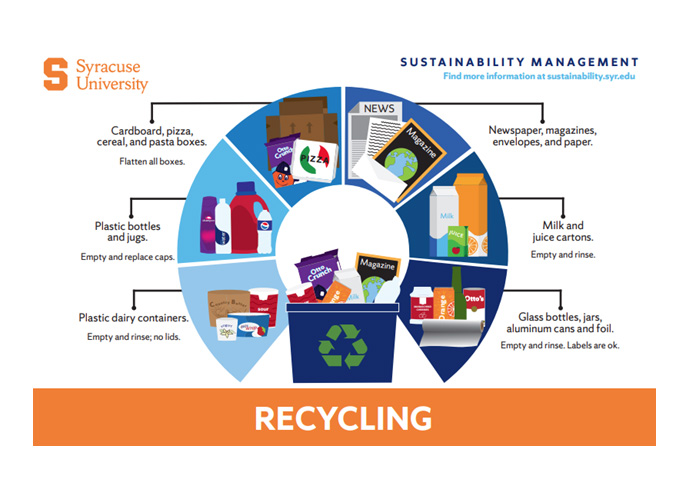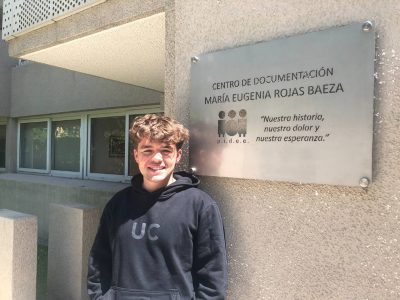Talking Trash at Syracuse University
Do you know what happens to your trash once you throw it away? Many tend to forget about their garbage once it’s out of sight, but waste management plays an important role in reducing greenhouse gas emissions and providing a clean and safe environment for community members.
Syracuse University makes a conscious effort to reduce the amount of waste produced on and around campus. The University partners with Syracuse Haulers Waste Removal and the Onondaga County Resource Recovery Agency (OCRRA) to dispose of any waste. OCRRA is the agency that oversees what happens to waste and recycling in the county. Recycling is mandatory in Onondaga County and therefore, on campus.
The University uses a single stream recycling program, meaning all recyclables can be disposed of in one bin or container and are later sorted by material. Mandatory recyclables include glass, certain plastics, paper, cardboard and cans/bottles. Below you can find a list of recyclable items and a printable fact sheet [PDF].
- Stackable plastic tubs from such products as yogurt, margarine or cottage cheese
- Pizza boxes—remove leftover food product and crumbs (the grease is okay)
- Plastic bottles and jugs (with handle) with the cap still on (throw cap out if not on the bottles)
- Paper, including newspapers, magazines, softcover books (i.e., paperbacks, phone books, manuals, workbooks, notebooks, etc.)—remove any spiral, wire or plastic binding; hardcover books are not accepted
- Metal, including food and beverage cans, aluminum foil, aerosol cans
- Glass, including food containers, beverages containers, and wine and liquor bottles
- Paperback cardboard (i.e., cereal boxes) and broken-down cardboard boxes
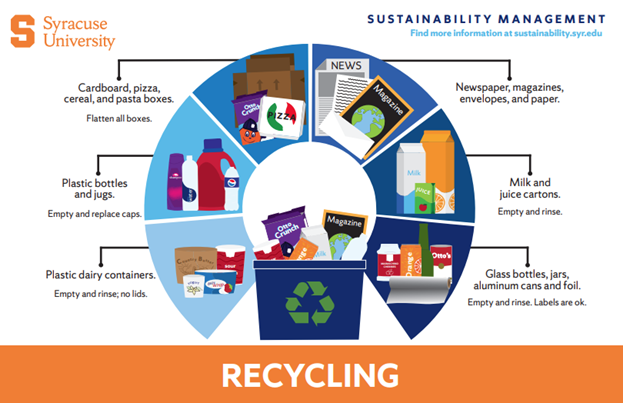
Unfortunately, recycling receptacles are often contaminated with garbage, which means recyclable items are discounted. When disposing of an item, be aware of the proper way to handle it. If you’re unsure whether an item is recyclable, it’s best to throw it in the garbage since a recycling container with the wrong items will often be thrown out.
The University also recycles specialized items—including batteries, electronics, polystyrene shipping boxes, fluorescent light bulbs and scrap metal. During many building renovations and new construction projects, materials and debris are recycled. This is generally the case with all LEED (Leadership in Energy and Environmental Design) certified buildings.
If you’re looking to dispose of any paint and aerosol cans on campus, they must be labeled and placed in the room’s Regulated Waste Satellite Accumulation Area (SAA). The Hazardous Waste Operations staff pick up and remove the waste per a schedule or upon request. From there, generally, any paint that is disposed of must be characterized into hazardous (oil-based/flammable) or non-hazardous (latex/water based). In some cases, the non-hazardous paint can be sent for recycling.
Waste aerosol cans undergo a process called “aerosol can puncturing.” Hazardous Waste Operations places each aerosol can into a specially designed puncturing device that punctures a hole in the can. Once the can is punctured and empty, it goes for scrap metal. The drum containing the aerosol can remnants is turned over to the University’s Hazardous Waste Contractor.
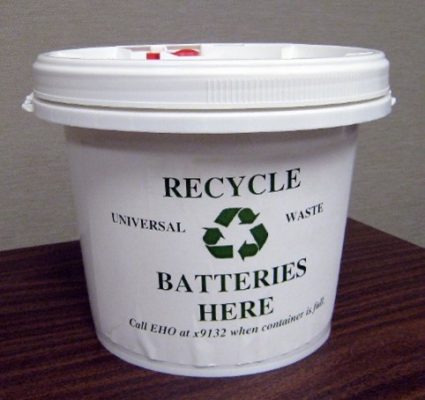
In terms of electronic waste, battery drop-off bins are located in each academic building. Environmental Health and Safety Services (EHSS) transports the batteries to its central facility for sorting. The alkaline, single-use batteries get sent to the OCRRA transfer station while the rechargeable batteries get sent to a battery recycler named Call2Recycle. EHSS even collects lead acid batteries which get taken to a local scrap metal recycler. Materials Distribution also accepts and will pick up cartridges of any type from all University employees when they complete this form.
As of Jan. 1, 2022, the New York State Food Donation and Food Scraps Recycling Law [PDF] requires businesses and institutions that generate an annual average of two tons of waste food per week or more must donate excess edible food and recycle all remaining food scraps if they are within 25 miles of an organic recycler (composting facility, anaerobic digester, etc.) Food Services does its best to plan each day’s production accurately but it’s very difficult to not have any food leftover. Fortunately, Food Services partners with the Food Recovery Network (FRN) student organization to collect uneaten food and donate it to local agencies in need.
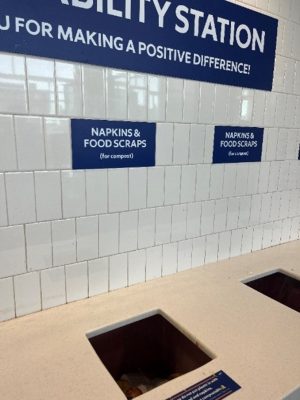
Food Services also partakes in composting. Composting of pre- and post-consumer food waste at all major dining locations and the Food Services’ Commissary helps divert tons of material from landfills. Students living on South Campus can also drop off food scraps in the bins outside of the Carriage House (161 Farm Acre Road) to be composted. This compost is then taken to the Amboy compost site in Camillus, which is handled by OCRRA. Compostable items include:
- fruit, beans and vegetable scraps
- pumpkins
- bread and grains
- dairy
- fish
- meat
- coffee grounds and filters
- popped popcorn, not in the bag
- eggshells
- cardboard egg cartons
- paper towels and napkins
- newspaper
- teabags
- bones
- brush, garden waste, grass, hay, hedge trimmings, leaves, pinecones, pine needles, plants, root balls, sticks, straw, stumps, tree limbs, tree trunks and vines
If you’re using a bag to line your own composting receptacle or to dispose of your items, be sure it’s also compostable.
Items that are not classified as recyclable or compostable are thrown in the trash. Receptacles in each building are separated into trash and recycling and presorted by individuals. Garbage and recycling dumpsters are then picked up and brought to the Syracuse Haulers facility. Individuals sort through the single stream recycling at the facility into clean cardboard, paper, different types of glass, etc. Based on waste and recycling data from fiscal year 2019-20 through fiscal year 2021-22, on average, the University’s recycling accounted for 54%. The goal is to continue to grow this number.
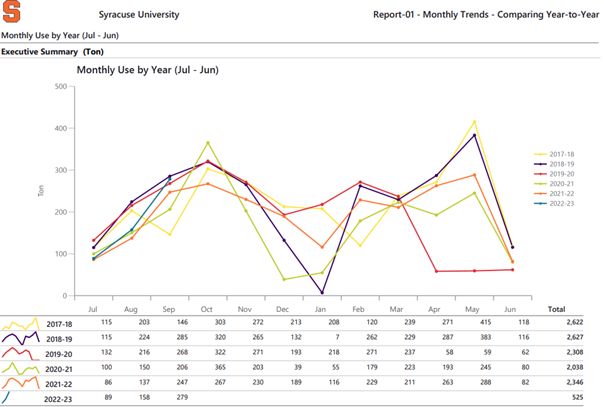
Anything picked up as trash by Syracuse Haulers, is taken to the Waste-to-Energy Facility in Jamesville. The energy produced at this facility is enough to power 21,000 homes for a year and significantly reduces the amount of greenhouse gas emissions emitted from a landfill. All of the facility’s emissions are carefully monitored by the New York State Department of Environmental Conservation.
To learn more about sustainability measures and initiatives at Syracuse, visit sustainability.syracuse.edu.
